1. For those of you who haven’t yet heard of Jeff Cubos, he’s an extremely intelligent and knowledgeable guy! I follow him on Twitter and read his blog. Jeff, please introduce yourself to the readers! Include qualifications, certifications, education, etc.
Thanks for the interview Bret. I’m truly honored to be able to share some thoughts and ideas with you and your readers and since I know your site is an educational one, hope I can provide some information that people can take away with them. To cut to the chase, I am a sport chiropractor but if you want the whole shebang, I am a Bachelor of Physical Education & Health, a Master of Science in Kinesiology & Health Science, a Doctor of Chiropractic, and a Fellow of the Royal College of Chiropractic Sports Sciences. Now for those that really care, I also hold my ICSSD and my CSCS. I have a number of other certifications and qualifications but these are mostly “tools” in my toolbox and I am of the belief that no matter how sharp your tools are, they mean very little if you use them when they are not indicated.
2. Many strength coaches are somewhat skeptical about chiropractors. How do you feel about this topic and what do you think that chiropractors should be doing to “raise the bar” for the profession?
To be honest with you, I can’t blame them. I can honestly say that I have encountered a lot of red tape simply for the fact that I am a chiropractor and for this I have to thank my ancestors. Don’t get me wrong, I am proud of who I AM, just not always proud of the letters that lie in between “E” and “B”. Having said that, I think every profession contains a few bad apples and there are two primary reasons for this: 1) a lack of integrity and 2) a lack of knowledge.
The latter, I cannot lay full blame. They simply do not know what they do not know. As a result, dogma overrules and the treatment approach is very philosophical and emotional. The former, on the other hand, is simply as a result of $$$. Some individuals basically utilize their privileges as a means to achieve financial prosperity.
Now I will change gears and state that the chiropractic profession IS changing. Thanks to a select group of pioneers, we are now making headway and working hard to right the wrong. We can thank several institutions for this. CMCC (my alma mater) in particular, is leading the way with an evidence-based approach that hopefully will allow me to one day state without any reservation that chiropractic is the profession of choice for manual therapy.
So to answer your question about what we, as a profession, should be doing to raise the bar I would have to have to say that we need to make a commitment to stay in a continual pursuit of knowledge. If we do so then I think we’ll be ok.
3. What do you like to do for continuing education and how do you go about learning new stuff? In other words, what are your favorite conferences/seminars, journals, websites, blogs, authors, coaches, etc.?
In my opinion, the most important aspect of one’s continuing education is the development of a system. What I mean by that is it is very easy to read this, intern here, mentor there, attend that, and so on. Patrick Ward recently wrote a piece called Lost in Translation and I think he hit it bang on. We need to learn with intent. Let me say that again,
WE NEED TO LEARN WITH INTENT!
For those still in school, you need to shadow. Shadow a variety of people in your profession and just be a french toast fly on the wall. Soak it all up.
For the new grads, read your texts. Get the big picture. Put yourself in a position to understand the recently published article that you think you need to read. Let me give you an example for us in the medical professions: That orthopaedic special test for the glenohumeral labrum that has 100% specificity and sensitivity means squat if you don’t know the basic biomechanics of the shoulder.
For those that are starting to climb the ladder, brush up on your stats. Learn how to read the research. Just because an article was published doesn’t mean it is valid. If you need help with this, just ask Mark Young. And if you’re one who just reads abstracts and conclusions, please (and respectfully) do us all a favor consider another profession. Thank you!
For those of you who are riding the waves, develop your own system. So to answer your question, here’s my system:
• I surround myself with like-minded and more intelligent individuals to learn off of and bounce ideas with.
• I read books to conceptualize and get an overall picture.
• I attend lectures, seminars, workshops, and conferences – but only when I have pre-read the literature put forth by that particular speaker. Otherwise, the information would just go over my head.
• I read blogs and forums to stay in the know. One of the biggest limitations of many individuals is not knowing what they don’t know. Being familiar with the internet puts you in a position to at least KNOW what you don’t know.
Now for specifics. At random, my favorites (both new and old) are: sportsrehabexpert.com, hockeystrengthandconditioning.com, strengthcoach.com, researchreviewservice.com, SWIS symposiums, mikereinold.com, ericcressey.com, charlieweingroff.com, Pubmed (sorry, too many journals to name so I’m taking the easy way out), clinical rehabilitation specialists, Chaitow’s chat, RobertsonTraining Systems, PT Think Tank, Warren Hammer, Joe’s Training Room, Mark Young Training Systems, Dr. Yessis, Sweat Science, Optimumsportsperformance.com, boddickerperformance.com, Movement Science, KevinNeeld.com, and obviously your site. I frequent many others as well but Big Brother is on and I can’t stay on the computer all night.
4. In general, what are some things that you feel strength coaches today are doing well?
Expanding their knowledge and pushing the boundaries.
I have to commend strength coaches both young and old for rising to the occasion and becoming prominent figures in sport. It wasn’t too long ago when we had the coach, the doctor/trainer, and the equipment guy. While this industry still has a long way to go, the artistic application of the sciences has not only provided us with athletes that are more powerful, but also at less risk of injury. Further, when you have strength coaches education medical professionals on how to prevent injury…that’s a phenomenal thing!
5. In general, what are some things that you feel that strength coaches today are not doing well?
Expanding their knowledge and stepping over the boundaries.
Unfortunately, we also have a small issue of “trying to do too much”. As someone who works full time in a clinical setting, most strength coaches would not want me to take an athlete post-rehabilitation and start training them for athletic performance. Conversely, if an athlete has an injury, I would expect them to referred to a physical therapist, chiro, athletic trainer or doc for proper care. That is why we have the different professions in the first place. From a SCFE to an avulsion fracture to a deep vein thrombosis, it only take one mis-managed athlete to screw up. And remember, insurance only covers one for what is in their scope of practice.
6. Rapid Response Time:
Place of Birth: Toronto, Ontario, Canada
Current City of Residence: Spruce Grove, Alberta, Canada
Favorite Type of Music: Treating patients – classical. Warming up – hip hop. Training – metal. Driving – culture reggae. Hanging with the wife – new country.
Favorite 3 Movies: The Rock, Point Break & American Pie
Favorite 3 Exercises: Front squat, hang clean, hip thrust (not because of you but because of all the looks I get in the gym from BOTH genders).
Favorite Type of Food: Mom’s cooking (Filipino food)
Favorite Type of Training: Cycling (for triathlons)
Favorite Sport to Play: Lacrosse
Favorite Sport to Watch: Hockey
Biggest 3 Influences: Ed Ratz, Jess Cubos, Myself (that is not a lie, I can honestly say that my drive, determination, and desire comes from within – hope you all don’t take that the wrong way).
Favorite 3 Books:
Athletic Injuries & Rehabiliation – Zachazewski
Einstein: His life and universe – Isaacson
Rich Dad Poor Dad – Kiyosaki
7. Thank you very much for the interview Jeffrey!!! Before you go, do you have any projects in the near future, and where can readers find out more about you?
Thanks for the opportunity, Bret. My first project is to expand on questions 4 & 5 and I intend to do so via question and answer in your comments section. I have a ton of opinions on these topics but believe an interactive discussion is necessary to fully explain myself. As for “real” projects, I am really contemplating further study. I have a ton of questions that I want answered and would love the opportunity to address these via a PhD in rehab sciences. I’m not sure if and when this will happen but it is a strong consideration. In particular, I really want to examine the true predictive ability for risk identification of several screening and testing tools that are out on the market but with relatively little supportive evidence. As for more information about myself, I enjoy spending time jotting down thoughts on jeffcubos.com.


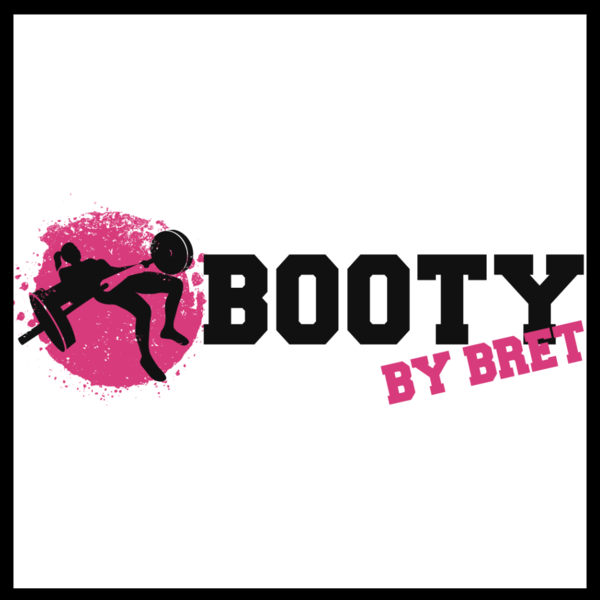
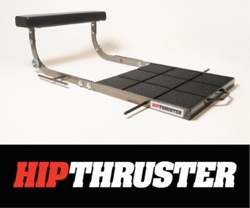
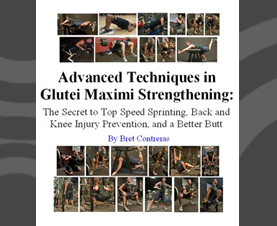
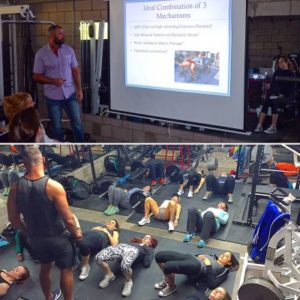
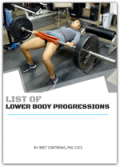
Great interview Bret! What a breath of fresh air for the chiropratic profession; I wish we had more Chiros like Jeff!
Thanks Keats! I concur!!!
…a few more things:
What I listen to (cont’d): Hanging with the wife – new country
Question 4: I have to commend strength coaches both young and old for rising to the occasion and becoming prominent figures in sport. It wasn’t too long ago when we had the coach, the doctor/trainer, and the equipment guy. While this industry still has a long way to go, the artistic application of the sciences has not only provided us with athletes that are more powerful, but also at less risk of injury. Further, when you have strength coaches education medical professionals on how to prevent injury…that’s a phenomenal thing!
5. Unfortunately, we also have a small issue of “trying to do too much”. As someone who works full time in a clinical setting, most strength coaches would not want me to take an athlete post-rehabilitation and start training them for athletic performance. Conversely, if an athlete has an injury, I would expect them to referred to a physical therapist, chiro, athletic trainer or doc for proper care. That is why we have the different professions in the first place. From a SCFE to an avulsion fracture to a deep vein thrombosis, it only take one mis-managed athlete to screw up. And remember, insurance only covers one for what is in their scope of practice.
Jeff these are excellent thoughts and ones that in my opinion should have been part of the initial interview!!!
Thanks Bret. Feel free to cut and paste it back into the original.
My bad on the typos. Still getting used to the iToy
Okay Jeff; I incorporated the new information.